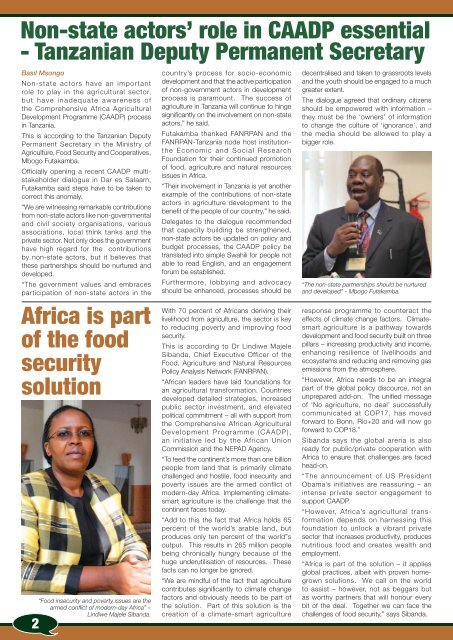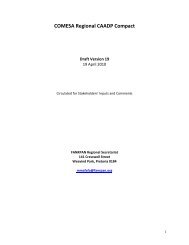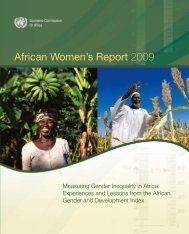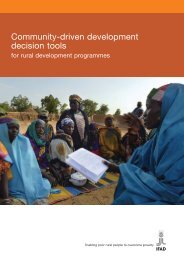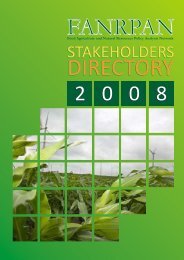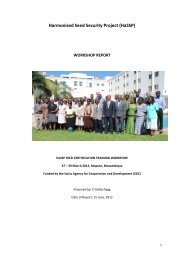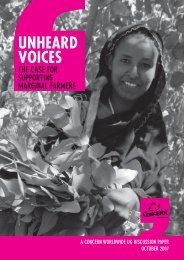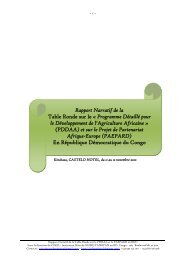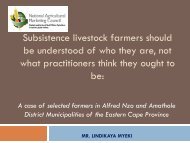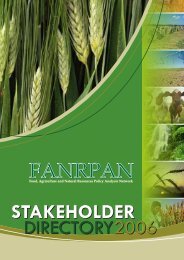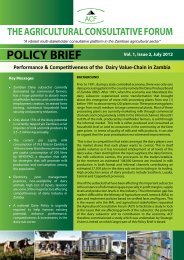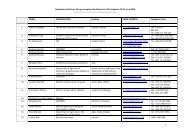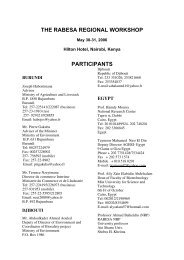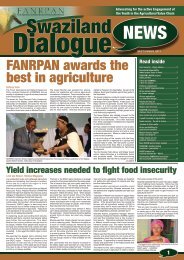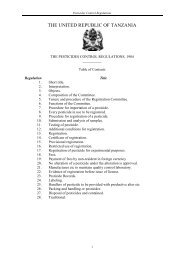Download newsletter (1.1Mb ~ 3 min) - FANRPAN
Download newsletter (1.1Mb ~ 3 min) - FANRPAN
Download newsletter (1.1Mb ~ 3 min) - FANRPAN
Create successful ePaper yourself
Turn your PDF publications into a flip-book with our unique Google optimized e-Paper software.
Non-state actors’ role in CAADP essential- Tanzanian Deputy Permanent SecretaryBasil MsongoNon-state actors have an importantrole to play in the agricultural sector,but have inadequate awareness ofthe Comprehensive Africa AgriculturalDevelopment Programme (CAADP) processin Tanzania.This is according to the Tanzanian DeputyPermanent Secretary in the Ministry ofAgriculture, Food Security and Cooperatives,Mbogo Futakamba.Officially opening a recent CAADP multistakeholderdialogue in Dar es Salaam,Futakamba said steps have to be taken tocorrect this anomaly.“We are witnessing remarkable contributionsfrom non-state actors like non-governmentaland civil society organisations, variousassociations, local think tanks and theprivate sector. Not only does the governmenthave high regard for the contributionsby non-state actors, but it believes thatthese partnerships should be nurtured anddeveloped.“The government values and embracesparticipation of non-state actors in theAfrica is partof the foodsecuritysolution2“Food insecurity and poverty issues are thearmed conflict of modern-day Africa” –Lindiwe Majele Sibanda.country’s process for socio-economicdevelopment and that the active participationof non-government actors in developmentprocess is paramount. The success ofagriculture in Tanzania will continue to hingesignificantly on the involvement on non-stateactors,” he said.Futakamba thanked <strong>FANRPAN</strong> and the<strong>FANRPAN</strong>-Tanzania node host institutiontheEconomic and Social ResearchFoundation for their continued promotionof food, agriculture and natural resourcesissues in Africa.“Their involvement in Tanzania is yet anotherexample of the contributions of non-stateactors in agriculture development to thebenefit of the people of our country,” he said.Delegates to the dialogue recommendedthat capacity building be strengthened,non-state actors be updated on policy andbudget processes, the CAADP policy betranslated into simple Swahili for people notable to read English, and an engagementforum be established.Furthermore, lobbying and advocacyshould be enhanced, processes should beWith 70 percent of Africans deriving theirlivelihood from agriculture, the sector is keyto reducing poverty and improving foodsecurity.This is according to Dr Lindiwe MajeleSibanda, Chief Executive Officer of theFood, Agriculture and Natural ResourcesPolicy Analysis Network (<strong>FANRPAN</strong>).“African leaders have laid foundations foran agricultural transformation. Countriesdeveloped detailed strategies, increasedpublic sector investment, and elevatedpolitical commitment – all with support fromthe Comprehensive African AgriculturalDevelopment Programme (CAADP),an initiative led by the African UnionCommission and the NEPAD Agency.“To feed the continent’s more than one billionpeople from land that is primarily climatechallenged and hostile, food insecurity andpoverty issues are the armed conflict ofmodern-day Africa. Implementing climatesmartagriculture is the challenge that thecontinent faces today.“Add to this the fact that Africa holds 65percent of the world’s arable land, butproduces only ten percent of the world”soutput. This results in 265 million peoplebeing chronically hungry because of thehuge underutilisation of resources. Thesefacts can no longer be ignored.“We are <strong>min</strong>dful of the fact that agriculturecontributes significantly to climate changefactors and obviously needs to be part ofthe solution. Part of this solution is thecreation of a climate-smart agriculturedecentralised and taken to grassroots levelsand the youth should be engaged to a muchgreater extent.The dialogue agreed that ordinary citizensshould be empowered with information –they must be the ‘owners’ of informationto change the culture of ‘ignorance’, andthe media should be allowed to play abigger role.“The non-state partnerships should be nurturedand developed” - Mbogo Futakamba.response programme to counteract theeffects of climate change factors. Climatesmartagriculture is a pathway towardsdevelopment and food security built on threepillars – increasing productivity and income,enhancing resilience of livelihoods andecosystems and reducing and removing gasemissions from the atmosphere.“However, Africa needs to be an integralpart of the global policy discource, not anunprepared add-on. The unified messageof ‘No agriculture, no deal’ successfullycommunicated at COP17, has movedforward to Bonn, Rio+20 and will now goforward to COP18.”Sibanda says the global arena is alsoready for public/private cooperation withAfrica to ensure that challenges are facedhead-on.“The announcement of US PresidentObama’s initiatives are reassuring – anintense private sector engagement tosupport CAADP.“However, Africa’s agricultural transformationdepends on harnessing thisfoundation to unlock a vibrant privatesector that increases productivity, producesnutritious food and creates wealth andemployment.“Africa is part of the solution – it appliesglobal practices, albeit with proven homegrownsolutions. We call on the worldto assist – however, not as beggars butas worthy partners that will honour everybit of the deal. Together we can face thechallenges of food security,” says Sibanda.


